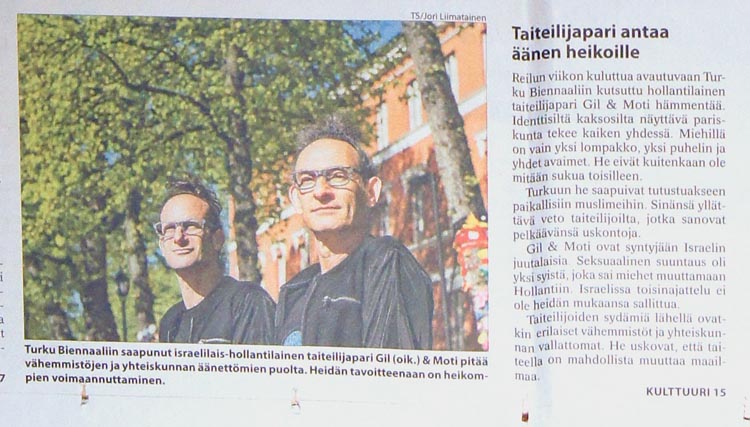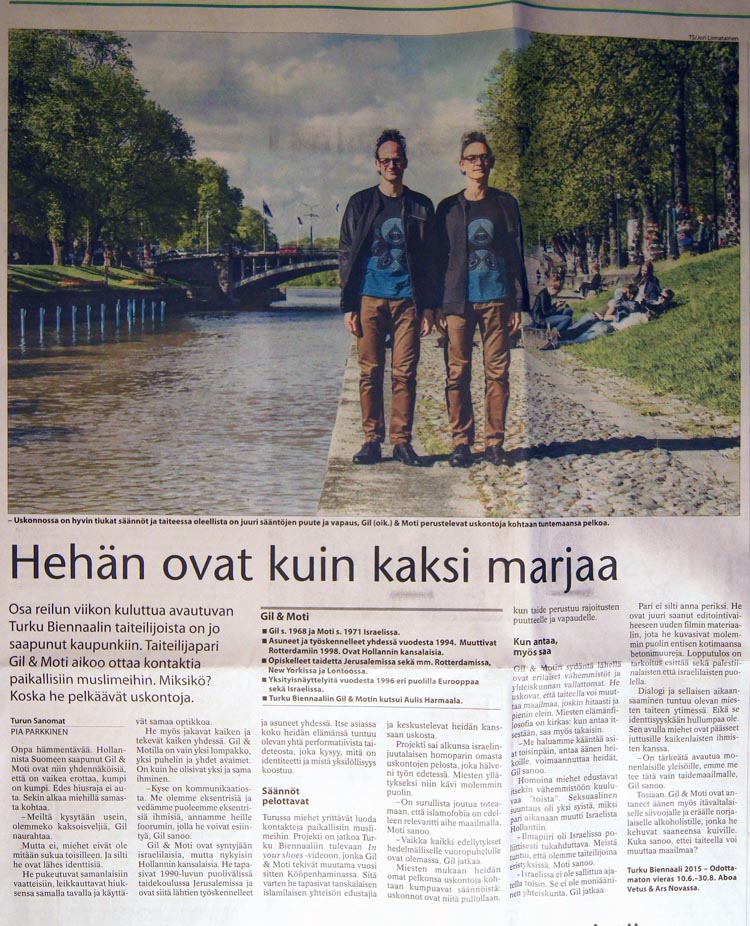Turun Sanomat , Finland, Wednesday 3 June 2015
They are like two peas in a pod
Pia Parkkinen
English translation: Raila Tapio
This
is confusing. Gil & Moti, who have arrived from the Netherlands in
Finland, look so alike that it’s difficult to recognize which one is
which. Even the hairline does not help. That also is starting from the
same point.
• We are often asked if we are twins, Gil chuckles.
But no, these men are not related. Yet they look almost identical.
They wear the same kind of clothes, get their hair cut in the same style and rely on the same optician.
They also share everything and do everything together. Gil & Moti
possess only one wallet, one phone and one key. It feels like they are
one and only person.
• It is a matter of communication. We are eccentric and we attract
eccentric people. We provide them a platform where they can perform,
Gil says.
• Originally, Gil & Moti are from Israel but nowadays they are
Dutch citizens. Ever since they met in an art school in Jerusalem, they
have been working and living together. In fact, their whole life seems
to be a comprehensive performance, which questions what identity is and
of which ingredients individuality consists of.
In Turku, Gil & Moti are trying to connect with local Muslims. The
project is a continuation of the video work In your Shoes, which is
going to be shown in the Turku Biennial. The video was made two years
ago in Copenhagen. For the video Gil & Moti met members of Danish
Islamic community and talked about religion with them.
The Project began from a fear the Israeli Jewish gay couple felt
towards the religion, but as the work proceeded, the fear disappeared.
For their great surprise, this happened mutually.
• It is sad that Islamophobia is still a relevant subject in this world we live, says Moti.
• Even though all the prerequisites for a fruitful dialogue exist, Gil continues.
According to the artists, their own fears towards religion in general
is to do with sets of rules; religions are full of them, whereas art is
based on freedom and lack of limits.
Different kinds of minorities and rambunctious people of society are
close to Gil & Moti’s heart(s). They believe that art can change
the world, if slowly and step by step. Their philosophy of life is
clear: When you give something from yourself, you get something in
return.
• We want to turn things the other way around, give a voice to the weak, empower them, Gil says.
As a gay couple, they represent the minorities, the “other”. Sexual
orientation was one of the reasons why they once moved out of Israel to
Holland.
• The atmosphere in Israel was politically suppressive. We felt that we as artists were isolated, Moti says
• It is not accepted to think differently in Israel. It’s not a polofonic society, Gil continues.
Yet they do not give up. The material of their new film, of which they
filmed on the both sides of the concrete walls of their former home
country, is going to be edited soon. The work is supposed to be shown
on both the Israeli and the Palestinian side.
It seems that a dialogue, and creating one, seems to be at the heart of
their art. And their identical looks isn’t too bad either. It has made
possible all the different conversations with all kinds of people.
• It’s important to be open for various people, not just for the regular art spectators , Gil says.
Indeed. Gil & Moti have also given a voice for a Dutch cleaner and
for a Norwegian alcoholic guy, who got sober with the help of them. Who
says that art can’t change the world?

